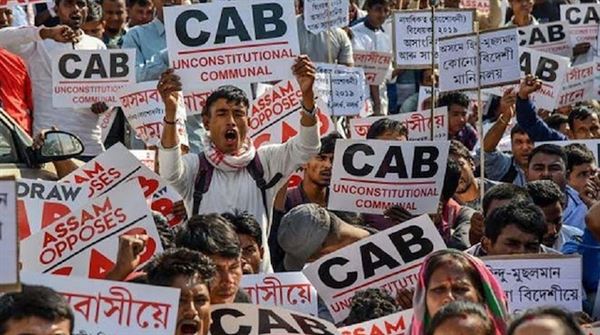India’s lower house of parliament passed the contentious Citizenship Amendment Bill on Monday, with 311 voting in support and 80 against. The b
India’s lower house of parliament passed the contentious Citizenship Amendment Bill on Monday, with 311 voting in support and 80 against.
The bill was cleared after nearly 12 hours of debate and will now be presented in the upper house.
Under the bill, citizenship would be granted to Hindus, Buddhists, Sikhs, Jains, Parsis and others who have fled from religious persecution in mainly Pakistan, Bangladesh and Afghanistan provided they can prove who they are and show evidence that they have resided in India for six years. But Muslims in the same position would be deported or jailed.
“The Citizenship Amendment Bill does not include Muslim migrants from Pakistan, Bangladesh and Afghanistan only because they are not minorities there,” Home Minister Amit Shah said while rejecting allegations that the bill was anti-Muslim.
He also told the house that Rohingya refugees will never be accepted as citizens.
“Rohingya will never be accepted as citizens of India. They infiltrated India through Bangladesh. The came from Myanmar,” Shah said.
Badruddin Ajmal, leader of the All India United Democratic Front (AIUDF), said his party will go to the Supreme Court if the bill is passed in both the houses.
All India Majlis-e-Ittehad-ul-Muslimeen (AIMIM) chief Asaduddin Owaisi also opposed the bill, saying it violates people’s fundamental rights.
Owaisi created a stir by tearing up a copy of the bill, saying it intends to make Muslim migrants stateless.
“This law is worse than Hitler’s law. The Muslims are getting dominated,” he added.
Adhir Ranjan Chowdhury of the Congress party said the ruling Bharatiya Janata Party (BJP) is trying to turn India into a Hindu Rashtra, or Hindu nation.
Meanwhile, Northeastern states witnessed widespread protest against the bill.
Various organizations have called for a strike in Assam and several other parts of the northeast on Dec. 9 and 10.
The bill, which endorses citizenship for non-Muslim migrants from neighboring countries, has been vehemently opposed in the northeast region, which has already been plagued by infiltrators from Bangladesh.
The North East Students’ Organization (NESO), an umbrella body of the region’s major students’ associations, has also called for an 11-hour strike on Dec. 10.
On Sunday, prominent personalities from the fields of art, culture, literature and film took to the streets to express their opposition to the bill.
The All Assam Students Union (AASU) — one of the most influential organizations in the region, which spearheaded a six-year long movement known as the Assam Agitation to drive out illegal migrants from Assam in the 1980s — also announced a separate series of protests across the state.
Under the Assam Accord, which was signed after the Assam Agitation, the cutoff date to detect illegal citizens was March 24, 1971, irrespective of their religion, caste or creed.
But the Citizenship Amendment Bill, if passed, will help non-Muslim migrants who entered the country before Dec. 31, 2014 obtain citizenship.
Pakistan’s Ministry of Foreign Affairs meanwhile condemned the legislation in a statement, saying it is in complete contravention of various bilateral agreements between Pakistan and India, particularly one concerning security and the rights of minorities in the respective countries.
“The latest legislation is another major step towards the realization of the concept of ‘Hindu Rashtra,’ idealized and relentlessly pursued by the right-wing Hindu leaders for several decades. It is driven by a toxic mix of an extremist ‘Hindutva’ ideology and hegemonic ambitions in the region.
“The continuing persecution of 8 million unarmed and innocent Kashmiris, collectively incarcerated and penalized by 900,000 Indian occupation forces, goes to further illustrate this blatantly extremist mindset,” it said.
